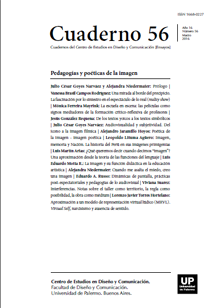La escuela en escena: las películas como signos mediadores de la formación crítico-reflexiva de profesores1
Abstract
The aim of this article is to discuss how movies could be important mediators signs for teacher training. After an initial discussion on the concept of critical-reflective training we will discuss the value of the image as one of the tools that dominate contemporary communication, and will stand the potential of movies and fiction to create opportunities for the construction of new knowledge and experiences. Also, we will discuss the role of movies as mediator signs in reflective teacher education. To illustrate the effects of such signs in the development of the reflective stance of teachers, we present some evidence of the problems faced by teachers in a course of initial training, resulting from their exposure to movies featuring teachers and students play different educational situations.
References
Alarcão, I. (2003). Professores reflexivos em uma escola reflexiva. São Paulo: Cortez Editora.
Almeida, M. J. (2001). Imagens e sons. A nova cultura oral. São Paulo: Cortez Editora.
Contreras, J. (2002). A autonomia de professores. São Paulo: Cortez Editora.
Costa, C. (2005). Educação, imagem e mídias. São Paulo: Cortez Editora.
Dewey, J. (1933). How we think. Lexington: D.C. Heath and Company.
_______. (1938/1967). Experience and Education. New York: Collier Books.
Duarte, N. (2000). Vygotsky e o “Aprender a Aprender”. Críticas às Apropriações Neoliberais e Pós-Modernas da Teoria Vygotskyana. Campinas: Editora Autores Associados.
Freire, P. (1979). Educação e Mudança. Rio de Janeiro: Paz e Terra.
García, C. M. (1992). A formação de professores: centro de atenção e pedra-de-toque. In Nóvoa, A. (coord.), Os professores e a sua formação (pp. 53-76). Lisboa: Publicações Dom Quixote.
Gomes, R. (2004) Elo vital: a interação espectador/filme. Disponible en http://www.facom.ufba.br/sentido/elovital.html. Consulta en 11 de mayo de 2013.
Goyes N., J. C. (2002). Horizontes de la comunicación visual contemporánea. Disponible en http://www.ucm.es/info/especulo/numero22/com_visu.html. Consulta en 07 de mayo de 2013.
Joly, M. (1996). Introdução à análise da imagem. Campinas: Papirus Editora.
Kemmis, S. (1987). Critical reflection. In Wideen, M. F.; Andrews, I. (orgs.) Staff development for school improvement. A focus on the teacher. London: The Falmer Press.
Liberali, F. C. (2010). Formação crítica de educadores: Questões fundamentais. Campinas: Pontes Editores.
Mayrink, M. F. (2007). Luzes… câmera… reflexão: formação inicial de professores mediada por filmes. Tese de Doutorado. Programa de Linguística Aplicada e Ensino de Línguas. PUC/SP.
Perrenoud, P. (2002). A Prática Reflexiva no Ofício de Professor: Profissionalização e Razão Pedagógica. Porto Alegre: Artmed Editora.
Pimenta, S. G. (2002). Professor Reflexivo: construindo uma crítica. In Pimenta, S. G. y Ghedin, E. (orgs.) O professor reflexivo no Brasil: gênese e crítica de um conceito. (pp. 17- 52). São Paulo: Cortez.
Schön, D. A. (1983). The reflective practitioner - How professionals think in action. New York: Basic Books.
_______. (1987). Educating the reflective practitioner. San Francisco: Jossey-Bass Publishers.
_______. (1992). Formação de professores como profissionais reflexivos. In Nóvoa, A. (coord.) Os professores e a sua formação. Lisboa: Publicações Dom Quixote.
Vygotsky, L. S. (1930/1998). A formação social da mente. São Paulo: Martins Fontes.
_______. (1934/1999). Pensamento e Linguagem. São Paulo: Martins Fontes.
Zeichner, K. M. (1993). A Formação Reflexiva de Professores: Idéias e Práticas. Educa.
Los autores/as que publiquen en esta revista ceden los derechos de autor y de publicación a "Cuadernos del Centro de Estudios de Diseño y Comunicación", Aceptando el registro de su trabajo bajo una licencia de atribución de Creative Commons, que permite a terceros utilizar lo publicado siempre que de el crédito pertinente a los autores y a esta revista.


